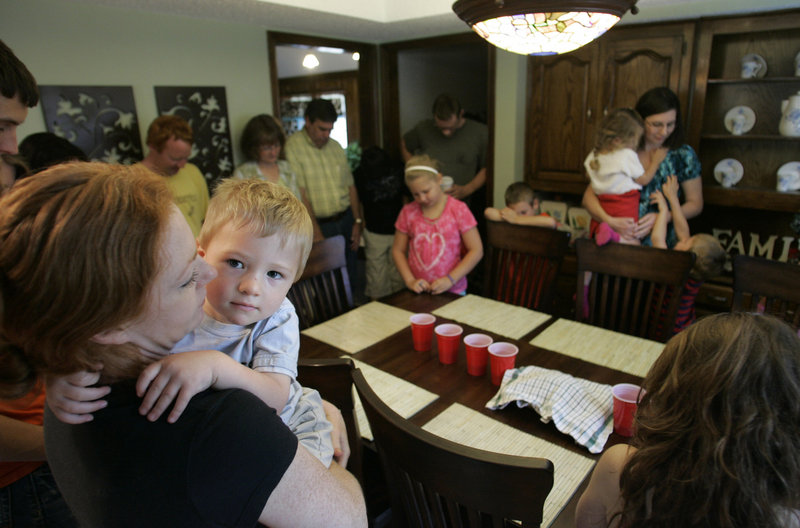DALLAS – To get to church on a recent Sunday morning, the Yeldell family walked no farther than their own living room to greet fellow worshippers.
The members of this “house church” are part of what experts say is a fundamental shift in the way U.S. Christians think about church. Skip the sermons, costly church buildings and faceless crowds, they say.
In general, house churches consist of 12 to 15 people who share what’s going on in their lives, often turning to Scriptures for guidance. They rely on the Holy Spirit or spontaneity to infuence the direction of their weekly gatherings.
“Part of the appeal for some in the house church movement is the desire to return to a simpler expression of church,” said Ed Stetzer, a seminary professor and head of Lifeway Research, which is affiliated with the Southern Baptist Convention.
House church proponents claim their small groups are sort of a throwback to the early Christian church in that they have no clergy and everyone is expected to contribute to the teaching, singing and praying.
They are more commonly seen in countries where Christianity is not the dominant religion. Organizers say they’re just starting to take off in the U.S.
A study by the Barna Group, which specializes in data on religion and society, estimates that 6 million to 12 million Americans attend house churches. A 2009 Pew Forum survey found that 9 percent of U.S. Protestants attended only home services.
“The only consistent thing about house church is that each one is different,” said Robin Yeldell, who, in 2006, left a traditional church where he was a missions committee chairman.
The gathering at the Yeldells’ home is a lively event. After fellowship, everyone gravitates to the kitchen to observe the Eucharist with prayer, sourdough bread and wine in plastic cups. There’s grape juice for the kids.
The celebration continues with a potluck meal. Back in the living room, one member with a guitar strums praise-and-worship songs that others softly sing.
Sparked by a previous discussion about whether they should start collecting an offering for the needy, Yeldell shares a PowerPoint presentation he created about “corporate giving.”
The majority seems averse to a regular offering, preferring to take up a collection only when a need or charitable cause arises.
As if on cue, Sean Allen, a laid-off welder who is now homeless with health issues, joined their gathering late. The soft-spoken Allen, 39, said he’d been sick and struggling to pay some bills.
“I’m just here,” he told fellow worshippers. “Do what you want. Let the Lord lead your heart.”
Allen, who recently converted to Christianity from Islam, said a friend at a traditional church introduced him to the house church, which he prefers and occasionally attends because “they’re more down to earth.”
A few people agreed to write checks directly to the companies Allen owes, while others debated whether money is the best way to help him. A couple with five children told Allen they couldn’t assist financially, but he was always welcome to join them in their home for meals.
“I’d say the vast majority of house churches we know are Christians honestly trying to live 24-7 for Jesus,” said Tony Dale of Austin. He and his wife, Felicity, are pioneers in the American house church movement.
Prospective worshippers usually locate house churches by searching the Internet or through word of mouth.
Members rotate the services from house to house and take turns facilitating gatherings.
Bill Benninghoff of Arlington, a former pastor of charismatic churches in Texas and North Carolina, has attended house churches exclusively since 2005.
“You get to know people in their good and bad times,” said Benninghoff, a software engineer.
He said he and his wife “felt lost in the big church on Sunday.”
Reggie McNeal, a South Carolina-based church leadership consultant, said many people experimenting with house church are doing so “under the radar,” especially in Bible Belt states.
“It’s kind of seen as a radical kind of approach,” he said. “An increasing number of people are saying that they don’t want to go to (any) church, so there better be a way for church to just be where people already are.”
Send questions/comments to the editors.



Success. Please wait for the page to reload. If the page does not reload within 5 seconds, please refresh the page.
Enter your email and password to access comments.
Hi, to comment on stories you must . This profile is in addition to your subscription and website login.
Already have a commenting profile? .
Invalid username/password.
Please check your email to confirm and complete your registration.
Only subscribers are eligible to post comments. Please subscribe or login first for digital access. Here’s why.
Use the form below to reset your password. When you've submitted your account email, we will send an email with a reset code.